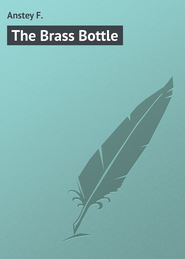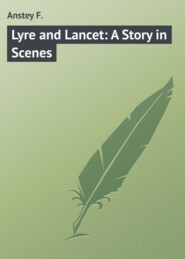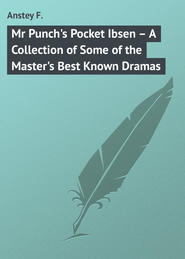По всем вопросам обращайтесь на: info@litportal.ru
(©) 2003-2024.
✖
The Black Poodle, and Other Tales
Настройки чтения
Размер шрифта
Высота строк
Поля
And at last, panting and exhausted, he reached the well-remembered gate, out of which he had marched so defiantly, it seemed long ages ago.
The railings were covered with wire netting inside, as he knew, but fortunately some one had left the gate open, and he pattered eagerly down the area steps feeling safe and at home at last.
The kitchen door was shut, but the window was not, and, as the sill was low, he contrived to scramble up somehow and jump into the kitchen, where he reckoned upon finding friends to protect him.
But he found it empty, and looking strangely cold and desolate; only a small fire was smouldering in the range, instead of the cheerful blaze he remembered there, and he could not find the cook – an especial patroness of his – anywhere.
He scampered up into the hall, making straight for the morning-room, where he knew he should find Hilda curled up in one of the arm-chairs with a book.
But that room was empty too – the shutters were up, and the half-light which streamed in above them showed a dreary state of confusion: the writing-table was covered with a sheet and put away in a corner, the chairs were piled up on the centre table, the carpet had been taken up and rolled under the sideboard, and there was a faint warm smell of flue and dust and putty in the place.
He pattered out again, feeling puzzled and a little afraid, and went up the bare stone staircase to find Hilda in one of the upper rooms, perhaps in the nursery.
But the upper rooms, too, were all bare and sheeted and ghostly, and, higher up, the stairs were spotted with great stars of whitewash, and there were ladders and planks on which strange men in dirty white blouses were talking and joking a great deal, and doing a little whitewashing now and then, when they had time for it.
Their voices echoed up and down the stairs with a hollow noise that scared him, and he was afraid to venture any higher. Besides, he knew by this time somehow that Hilda, her father and mother, all the friends he had counted upon seeing again, would not be found in any part of that house.
It was the same house, though stripped and deserted, but all the life and colour and warmth had gone out of it; and he ran here and there, seeking for them in vain.
He picked his way forlornly down to the hall again, and there he found a mouldy old woman with a duster pinned over her head and a dustpan and brush in her hand; for, unhappily for him, the family, servants and all, had gone away some days before into the country, and this old woman had been put into the house as caretaker.
She dropped her brush and pan with a start as she saw him, for she was not fond of dogs.
'Why, deary me,' she said morosely, 'if it hasn't give me quite a turn. However did the nasty little beast get in? a-gallivantin' about as if the 'ole place belonged to him.'
Dandy sat up and begged. In the old days he would not have done such a thing for any servant below a cook (who was always worth being polite to), but he felt a very reduced and miserable little animal indeed just then, and he thought she might be able to take him to Hilda.
But the charwoman's only idea was to get rid of him as quickly as possible.
'Why, if it ain't a Toby dawg!' she cried, as her dim old eyes caught sight of his frill. Here, you get out; you don't belong 'ere!'
And she took him up by the scruff of the neck and went to the front door. As she opened it, a sound came from the street outside which Dandy knew only to well: it was the long-drawn squeak of Mr. Punch.
'That's where he come from, I'll bet a penny,' cried the caretaker, and she went down the steps and called over the gate, 'Hi, master, you don't happen to have lost your Toby dawg, do you? Is this him?'
The man with the drum came up – it was Jem himself; and thereupon Dandy was ignominiously handed over the railings to him, and delivered up once more to the hard life he had so nearly succeeded in shaking off.
He had a severe beating when they got him home, as a warning to him not to rebel again; and he never did try to run away a second time. Where was the good of it? Hilda was gone he did not know where, and the house was a home no longer.
So he went patiently about with the show, a dismal little dog-captive, the dullest little Toby that ever delighted a street audience; so languid and listless at times that Mr. Punch was obliged to rap him really hard on the head before he could induce him to take the slightest notice of him.
But in spite of all this, he made the people laugh; most, perhaps, at night, when the show was lit up by a flaring can of paraffin, and he sat with his feet in Punch's coffin, howling dolefully at the melancholy strains of Jem's pipes, which Dandy always found too much for his feelings.
It was winter time, about a fortnight after Christmas, and the night was snowy and slushy outside, though warm enough in the kitchen of a big Belgravian house. The kitchen was crowded, a stream of waiters and gorgeous powdered footmen and smart maids was perpetually coming and going; in front of the fire a tired little terrier, with a shabby frill round his neck, was basking in the blaze, and near him sat a little dirty-faced man with a red beard, who was being listened to with some attention by a few of the upper servants, who were enjoying a moment's leisure.
'Yes,' he was saying, 'I've been in the purfession a sight o' years now, but I don't know as I ever heard on a Punch's show like me and my mate's bein' engaged for a reg'lar swell evenin' party afore. It shows, to my mind, as public taste is a-coming round – it ain't quite so low as formerly.'
The little man was Jem; and he, with his partner Bob, and Dandy, were in the house owing to an eccentric notion of its master, who happened to have a taste for experiments.
He agreed with many who consider that some kind of amusement in the intervals of dancing is welcome to children; but it was one of his ideas too that they must be getting a little bored by the inevitable lecture with the dissolving views, and find a conjuror (even after seeing him several times in a fortnight) as a rule more bewildering than amusing; although as a present-producing animal, the last has his compensations.
He was curious to see whether the drama of Punch and Judy had quite lost its old power to please. He could easily have hired an elegant and perfectly refined form of the entertainment from some of the fashionable toy-shops or 'universal providers,' only unfortunately in these improved versions much of the original fun is often found to have been refined away.
So he had decided upon introducing the original Mr. Punch from his native streets and in his natural uncivilised state, and Jem and Bob chanced to be the persons selected to exhibit him.
'Juveniles is all alike,' observed the butler, who, having been commissioned to engage the showmen, condescended to feel a fatherly interest in the affair; ''igh or low, there's nothing pleases 'em more than seeing one party a-fetching another party a thunderin' good whack over the 'ead. That's where, in my opinion, all these pantomimes makes a mistake. There's too much bally and music 'all about 'em and not 'arf enough buttered slide and red-'ot poker.'
'There's plenty of 'ead whackin' in our show,' said Jem, with some pride, 'for my partner, you see, he don't find as the dialogue come as fluid to him as he could wish for, so he cuts a deal of it, and what ain't squeakin' is mostly stick – like a cheap operer.'
'Your little dog seems very wet and tired,' said a pretty housemaid, bending down to pat Dandy, as he lay stretched out wearily at her feet. 'Would he eat a cake if I got one for him?'
'He ain't, not to say, fed on cakes as a general thing,' said Jem drily, 'but you can try him, miss, and thankee.'
But Dandy only half raised his head and rejected the cake languidly – he was very comfortable there in the warm firelight, and the place made him feel as if he were back in his own old kitchen, but he was too tired to be hungry.
'He won't hardly look at it,' said the housemaid compassionately. 'I don't think he can be well.'
'Well!' said Jem. 'He's well enough; that's all his contrariness, that is. The fact is, he thinks hisself a deal too good for the likes of us, he do – thinks he ought to be kep' on chickin in a droring-room!' he sneered, wasting his satire on the unconscious Dandy.
'I tell you what it is, miss: that there dawg's 'art ain't in his business – he reg'lar looks down on the 'ole concern, thinks it low! Why, I see 'im from the werry fust a-turnin' up his nose at it, and it downright set me against him. Give me a Toby as takes a interest in the drama! The last but one as we had, afore him, now, he used to look on from start to finish, and when Punch went and 'anged Jack Ketch, why, that dawg used to bark and jump about as pleased as Punch 'isself, and he'd go in among the crowd too and fetch back the babby as Punch pitched out o' winder, as tender with it as a Newfunland! And he warn't like the general run of Tobies neither, for he got quite thick with the Punch figger – thought a deal on 'im, he did – and if you'll believe me, when I 'ad to get the figger a noo 'ead and costoom, it broke the dawg's 'art – he pined away quite rapid. But this 'ere one wouldn't turn a 'air if the 'ole company went to blazes together!'
Here Bob, who had been setting up the show in one of the rooms, came into the kitchen, looking rather uneasy at finding himself in such fine company, and Dandy was spared further upbraidings, as he was called upon to follow the pair upstairs.
They went up into a large handsome room, where at one end there were placed rows of rout seats and chairs, and at the other the homely old show, seeming oddly out of place in its new surroundings.
Poor draggled Dandy felt more ashamed of it and himself than ever, and he was glad to get away under its ragged hangings and lie still by Bob's dirty boots till he was wanted.
And then there was the sound of children's voices and laughter as they all came trooping in, with a crisp rustle of delicate dresses and a scent of hothouse flowers and kid gloves, that reached Dandy where he lay: it reminded him of evenings long ago when Hilda had had parties, and he had been washed and combed and decked out in ribbons for the occasion, and children had played with him and given him nice things to eat – they had generally disagreed with him, but now he could only remember the pleasure and petting of it all.
He would not be petted any more! Presently these children would see him smoking a pipe and being familiar with that low Punch. They would laugh at him too – they always did – and Dandy, like most dogs, hated being laughed at, and never took it as a compliment.
The host's experiment was evidently a complete success: the children, even the most blasés, who danced the newest valse step and thought pantomines vulgar, were delighted to meet an old friend so unexpectedly. A good many had often yearned to see the whole show right through from beginning to end, and chance or a stern nurse had never permitted it. Now their time had come, and Mr. Punch, in spite of his lamentable shortcomings in every relation of life, was received with the usual uproarious applause.
At last the hero called for his faithful dog Toby, as a distraction after the painful domestic scenes, in which he had felt himself driven to throw his child out of window and silence the objections of his wife by becoming a widower, and accordingly Dandy was caught up and set on the shelf by his side.
The sudden glare hurt his eyes, and he sat there blinking at the audience with a pitiful want of pride in his dignity as Dog Toby.
He tried to look as if he didn't know Punch, who was doing all he could to catch his eye, for his riotous 'rootitoot' made him shiver nervously, and long to get away from the whole thing and lie down somewhere in peace.
Jem was scowling up at him balefully. 'I know'd that 'ere dawg would go and disgrace hisself,' he was saying to himself. 'When I get him to myself, he shall catch it for this!'
Dandy was able to see better now, and he found, as he had guessed, that here was not one of his usual audiences – no homely crowd of loitering errand boys, smirched maids-of-all-work, and ragged children jostling and turning their grinning white faces up to him.
There were children here too – plenty of them – but children at their best and daintiest, and looking as if untidiness and quarrels were things unknown to them – though possibly they were not. The laughter, however, was much the same as he was accustomed to, more musical perhaps, and pleasanter to hear, but quite as hearty and unrestrained – they were laughing at him, and he hung his head abashed.
But all at once he forgot his shame, though he did not remember Mr. Punch a bit the more for that; he ran backwards and forwards on his ledge, sniffing and whining, wagging his tail and giving short piteous barks in a state of the wildest excitement. The reason of it was this: near the end of the front row he saw a little girl who was bending eagerly forward with her pretty grey eyes wide open and a puzzled line on her forehead.
Dandy knew her at the very first glance. It was Hilda, looking more like a fairy princess than ever.











